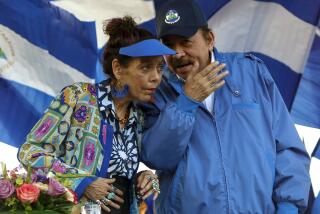Panama Banks Refuse Regime’s Order to Reopen : Snags Develop in Church Efforts at Mediation Between Noriega, Foes
- Share via
PANAMA CITY — Panamanian banks Thursday rejected a government demand that they reopen by the end of this week, dealing a blow to Gen. Manuel A. Noriega’s attempts to fend off American-led economic sanctions aimed at driving him from power.
Noriega desperately needs cash to meet government payrolls, including those of the 15,000-member Panama Defense Forces. Wage payments for civil servants and other public workers are believed to be about two weeks behind, and further delays could exacerbate anti-Noriega sentiment.
The banks’ closure also has prevented many companies from obtaining cash to pay workers’ wages, which has kept many businesses from reopening even after the demise of a two-week general strike. In turn, many companies have been unable to get funds to pay taxes to keep the government afloat.
Meanwhile, efforts by the Roman Catholic Church to mediate between Noriega and his opponents stumbled Thursday. Panamanian Archbishop Marcos G. McGrath met with opposition politicians and leaders of the Civic Crusade, the umbrella organization of 200 groups aligned against Noriega, to discuss possible church-sponsored negotiations with Noriega’s government.
But by day’s end, the church announced that opposition demands that Noriega step down before talks begin and the lack of a clear commitment by Noriega to resolve the crisis had torpedoed the mediation effort.
Since Panama City is still clearly a capital under siege, officials in Noriega’s government saw the opening of banks as a means to refuel at least modest economic activity. Few of the stores that have reopened in recent days are conducting any business as consumers spend what money they have only on necessities, especially food.
Parking lots in front of electronic goods stores and boutiques on main shopping thoroughfares remained virtually empty throughout the day.
Panama’s 12 domestic banks had agreed last week to reopen for limited business if Noriega’s government met four conditions, including the delivery of sufficient funds to the banks to cover withdrawal demands. Withdrawals were to be limited to 25% of checking account balances, up to a maximum of $10,000, and 5% of savings account balances.
Bankers fear a run on deposits if they reopen without adequate restrictions and funds to meet demand. Many bankers are sympathetic to the opposition campaign to remove Noriega, but at the same time they worry that continued defiance of Noriega could prompt him to nationalize the banks or seize the assets in their vaults.
The bankers had set out the conditions for reopening during talks in recent days with the government-dominated Panama Banking Commission. Those terms included a publicity campaign to inform Panamanians of the restrictions on withdrawals to avoid violence at the banks. No such campaign has materialized.
“Without these conditions being met, it is not possible for us to reopen,” one board member of a Panamanian bank said. He said the commission’s demand that the banks reopen without the safeguards “only secures the interests of the government.”
A Western financial analyst said of the bankers, “They are trying to stonewall as much as they can, without looking like it.”
The analyst, speaking on the condition that he not be identified, said Noriega’s success or failure in getting access to cash remained central to the outcome of the multifaceted anti-Noriega movement.
“It’s like a basketball game: There is a lot of movement on the court, but you’ve got to keep your eye on the ball, and the ball is money--whether Noriega can get his hands on the money,” the analyst said.
Panamanian and foreign banks shut their doors March 3 after the United States froze about $50 million in Panamanian assets.
With the collapse last week of a two-week general strike and the muzzling of other protests, the banks have proved to be the last main holdout in the economic campaign to force Noriega to step down and leave the country. The Reagan Administration still recognizes deposed civilian President Eric A. Delvalle as the rightful leader of Panama.
As many as half of the about 130 overseas banks with offices here are believed to be planning to shut permanently because of the political turmoil. That would bring dramatic changes in the structure of the Panamanian economy, 80% of which relies on banking and other service industries.
As further pressure, the Pentagon has dispatched an additional 1,300 troops to bolster its more than 10,000 forces already stationed in Panama at the U.S. Southern Command headquarters.
More to Read
Sign up for Essential California
The most important California stories and recommendations in your inbox every morning.
You may occasionally receive promotional content from the Los Angeles Times.













